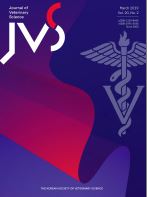Antiviral effects of Bovine antimicrobial peptide against TGEV in vivo and in vitro
- 대한수의학회
- Journal of Veterinary Science
- 제21권 제5호
-
2020.091 - 13 (13 pages)
-
DOI : 10.4142/jvs.2020.21.e80
- 3

Background: In suckling piglets, transmissible gastroenteritis virus (TGEV) causes lethal diarrhea accompanied by high infection and mortality rates, leading to considerable economic losses. This study explored methods of preventing or inhibiting their production. Bovine antimicrobial peptide-13 (APB-13) has antibacterial, antiviral, and immune functions. Objectives: This study analyzed the efficacy of APB-13 against TGEV through in vivo and in vitro experiments. Methods: The effects of APB-13 toxicity and virus inhibition rate on swine testicular (ST) cells were detected using 3-(4,5-dimethylthiazol-2-yl)-2, 5-diphenyl tetrazolium bromide (MTT). The impact of APB-13 on virus replication was examined through the 50% tissue culture infective dose (TCID₅₀). The mRNA and protein levels were investigated by real-time quantitative polymerase chain reaction and western blot (WB). Tissue sections were used to detect intestinal morphological development. Results: The safe and effective concentration range of APB-13 on ST cells ranged from 0 to 62.5 μg/mL, and the highest viral inhibitory rate of APB-13 was 74.1%. The log₁₀TCID₅₀ of 62.5 μg/mL APB-13 was 3.63 lower than that of the virus control. The mRNA and protein expression at 62.5 μg/mL APB-13 was significantly lower than that of the virus control at 24 hpi. Piglets in the APB-13 group showed significantly lower viral shedding than that in the virus control group, and the pathological tissue sections of the jejunum morphology revealed significant differences between the groups. Conclusions: APB-13 exhibited good antiviral effects on TGEV in vivo and in vitro.
INTRODUCTION
MATERIALS AND METHODS
RESULTS
DISCUSSION
REFERENCES
(0)
(0)